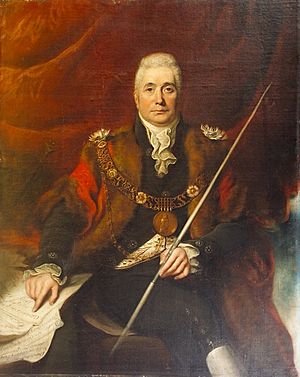John Claudius Beresford facts for kids
Quick facts for kids
John Claudius Beresford
|
|
|---|---|

Portrait by William Cumming
|
|
| Lord Mayor of Dublin | |
| In office 1814–1815 |
|
| Preceded by | John Cash |
| Succeeded by | Robert Shaw |
| Member of Parliament for County Waterford | |
| In office 6 January 1806 – June 1811 |
|
| Member of Parliament for Dublin City Irish Parliament (1798–1801) |
|
| In office 1798–1804 |
|
| Member of Parliament for Swords | |
| In office 1790–1798 |
|
| Personal details | |
| Born | 23 October 1766 |
| Died | 20 July 1846 (aged 79) |
| Political party | Tory |
| Spouse | Elizabeth McKenzie Menzies |
| Children | 5 |
| Parent | John Beresford (father) |
| Alma mater | Trinity College, Dublin |
| Military service | |
| Allegiance | |
| Branch/service | Yeomanry |
| Battles/wars | Irish Rebellion of 1798 |
John Claudius Beresford (born October 23, 1766 – died July 20, 1846) was an important Irish politician. He was a member of the Tory party. He served as a Member of Parliament (MP) for Dublin City from 1801 to 1804. Later, he was an MP for County Waterford from 1806 to 1811. He also held the important role of Lord Mayor of Dublin from 1814 to 1815.
Contents
Early Life and Career
John Claudius Beresford studied at Trinity College, Dublin. After his studies, he began working for the port of Dublin in 1783. He later received a well-paying job as Inspector-General of Exports and Imports. This job was known as a "sinecure," meaning it paid well but didn't require much work.
His father, John Beresford, helped him get elected to the Irish House of Commons in 1790. He represented the area of Swords. In 1798, he became an MP for Dublin City. His position at the port and his role in a major Dublin bank helped him win this election.
Role in the 1798 Rebellion
During the Irish Rebellion of 1798, John Claudius Beresford played a strong role against the rebels. He led a group of soldiers called a yeoman battalion. This group fought fiercely against the United Irishman rebels.
Beresford had a riding school in Dublin. This place became known for its harsh questioning of suspected rebels. Because of his actions, he was seen as a major opponent of the rebellion. The rebels even burned banknotes from his bank to show their anger. His reputation for being very strict with political opponents stayed with him throughout his career.
Opposing the Act of Union
Beresford was very active in the Irish House of Commons. He strongly disagreed with the idea of the Act of Union 1800. This Act would join the Kingdom of Ireland with Great Britain. He even tried to reduce how much Ireland would have to pay to the new combined government.
Unlike his father, John Claudius Beresford was against the Union until the very end. To show his strong opposition, he resigned from his job at the port in January 1799. He did not want anyone to think his actions were influenced by keeping his job.
Life After the Union
After the Act of Union was passed, John Claudius Beresford kept his seat in the first Parliament of the United Kingdom without needing a new election. He supported important politicians like William Pitt the younger and later Henry Addington. To focus on his work in Parliament, he had to give up his business interests in Ireland.
He was re-elected in the 1802 election, getting the most votes. In 1803, he surprisingly voted against the government on a motion to criticize them. In March 1804, he joined a committee about Irish money. He then resigned his seat by accepting a special job called the Escheatorship of Ulster. This was another "sinecure" job that paid him.
Impact on Irish Politics
After his father passed away in 1805, Beresford returned to Parliament. He won a special election to become the MP for Waterford County in 1806. He joined a political group led by Henry de La Poer Beresford. This group wanted to prevent the government from giving too much power to another family in Ireland, the Ponsonbys. John Claudius Beresford was the main spokesperson for his group when they met with government ministers.
Even though some expected him to oppose the government in 1806, Beresford actually supported them. This was because his bank faced financial problems, and he needed the government's help with credit. His support helped him get re-elected in the 1806 general election. Some government officials debated whether he could be trusted, but he was seen as loyal at the time.
However, he did not always support the government. In 1807, he became a supporter of the Duke of Portland. He was re-elected without opposition in the 1807 general election. He was sometimes unpredictable, and some of his speeches were thought to harm the government's cause. He strongly opposed starting peace talks with France in 1809.
Later Life and Public Service
In January 1811, John Claudius Beresford faced more serious financial problems. This kept him from attending Parliament for several months. In June, he resigned his seat by accepting another special job, the Escheator of Munster. His relative, Major General Sir William Carr Beresford, took his place as MP.
The next year, Beresford tried to get another government job but was turned down because he already had a good pension. He served as Lord Mayor of Dublin from 1814 to 1815. During this time, he was known for being very generous and welcoming. After his time as Lord Mayor, he mostly retired from public life.
 | Toni Morrison |
 | Barack Obama |
 | Martin Luther King Jr. |
 | Ralph Bunche |

